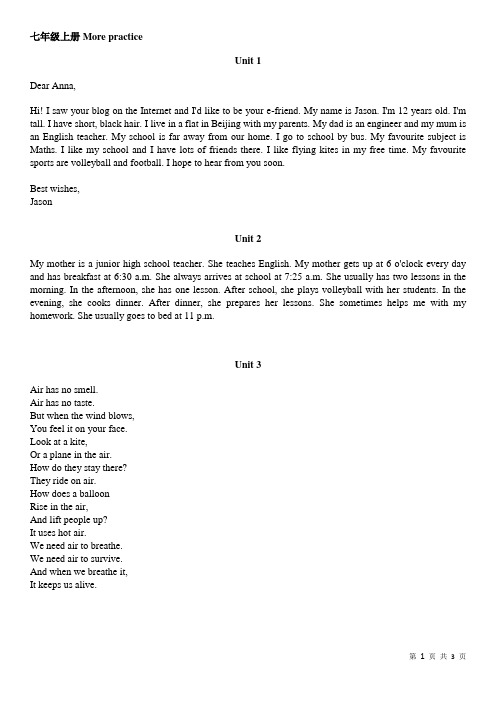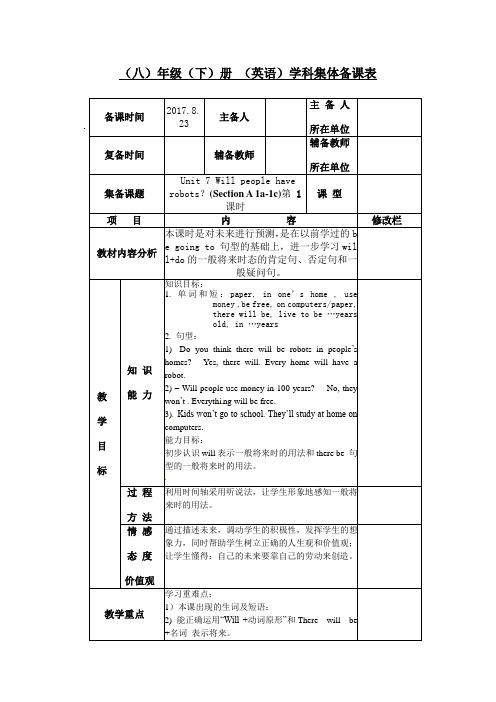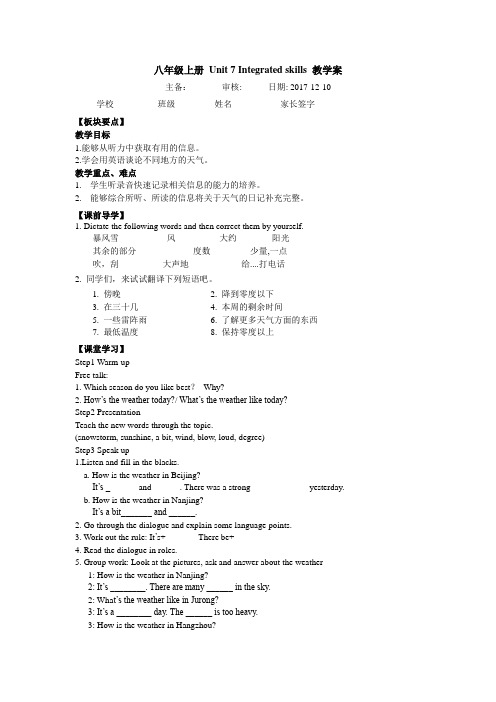8A Unit 7 more practice教案
2016 沈阳沪教版英语七年级上册 U1-U8 More practice原文

七年级上册More practiceUnit 1Dear Anna,Hi! I saw your blog on the Internet and I'd like to be your e-friend. My name is Jason. I'm 12 years old. I'm tall. I have short, black hair. I live in a flat in Beijing with my parents. My dad is an engineer and my mum is an English teacher. My school is far away from our home. I go to school by bus. My favourite subject is Maths. I like my school and I have lots of friends there. I like flying kites in my free time. My favourite sports are volleyball and football. I hope to hear from you soon.Best wishes,JasonUnit 2My mother is a junior high school teacher. She teaches English. My mother gets up at 6 o'clock every day and has breakfast at 6:30 a.m. She always arrives at school at 7:25 a.m. She usually has two lessons in the morning. In the afternoon, she has one lesson. After school, she plays volleyball with her students. In the evening, she cooks dinner. After dinner, she prepares her lessons. She sometimes helps me with my homework. She usually goes to bed at 11 p.m.Unit 3Air has no smell.Air has no taste.But when the wind blows,You feel it on your face.Look at a kite,Or a plane in the air.How do they stay there?They ride on air.How does a balloonRise in the air,And lift people up?It uses hot air.We need air to breathe.We need air to survive.And when we breathe it,It keeps us alive.The weather in ChinaIn the north of China, it is very cold and dry in winter. There is sometimes heavy snow. Summer is different. It is sometimes very hot during the day, but it is often cool in the evening. Spring and autumn are the nicest seasons.The weather in the middle and east of China is quite different. It is hot and dry in summer and very cold and wet in winter.In the south of China, winter is usually short and cool. It sometimes rains. In summer, the weather is often hot and wet.The weather in the south-west of China is very special. It is comfortable to live there because summer is cool and winter is warm.Unit 5Hotels on the MoonDo you want to spend your holidays in hotels on the Moon?At the moment, there are on hotels on the Moon. But all this will change. If we can solve some problems, we will be able to build hotels there in the future. The Moon is very cold, so the hotels will have to be warm. They will also need a large amount of air so that people there can breathe.The hotels on the Moon will have rooms with big windows so that you can see the Earth. You will be able to swim in the hotel swimming pool and see all the stars around you. But you should not get too excited. A trip to the Moon will cost a lot of money!Unit 6Hong Kong – a wonderful place to visitIf you like shopping, you will love Hong Kong. There are some expensive shops and also some cheap ones. There is something for everyone in Hong Kong.One of the most interesting places in Hong Kong is Ocean Park. You can visit the Lowland Gardens to see some animals, or get a bird's-eye view of the whole park by riding in a cable car. At the Ocean Theatre, you can watch a dolphin show.Visitors from all over the world come to Hong Kong every year and have a wonderful time.Unit 7A trip to Lucky IslandLast Sunday, my friends and I went on an adventure with the Hiking Club.The night before, I was so excited that I could not sleep! I got up really early on Sunday morning. After breakfast, I packed my lunch and left home quickly. I hurried to school and met the other students and Mr Li, our trip leader. When we were all there, we left for Lucky Island.The boat ride to Lucky Island was really exciting! We saw a lot of fish and colourful birds. When we got to Lucky Island, we went on a long walk and saw some pretty flowers. After the hike, we were very hungry! We sat on the beach and ate our lunch. After that, we played games and took pictures. We really enjoyed our selves. Finally it was time to go home. I cannot wait for my next adventure with Mr Li and the Hiking Club!Collecting stamps is educational!Yesterday was Show and Tell Day at Daniel’s school.Daniel was the first student to speak. He showed his classmates an old stamp.“My father gave me this first stamp,” said Daniel. “It has a picture of an old Chinese stone bridge on it. This made me more interested in Chinese culture. Soon I started to look for more stamps with interesting pictures.”“Now I have over 100 stamps,” said Daniel. “I learnt a lot about our country and its great culture from the stamps is really educational.”“That was a great talk. Thank you, Daniel,” said the teacher.。
8AUnit7Seasons教案(全)

8AUnit7Seasons教案(全)2)What’theweatherlikeinAutumn3)WhatcanAmydoinummer2.Readaft ertherecorder.3.Praticeinpair.4.Actitout.Step5.E某planation1.Bringmemyclothe,Hobo.bring带来take带走e.g.Pleaebringmemycoat.Takeyourbookhomeafterchool2.You’lllookco olandfeelcoolwithnothingon!lookcool看起来酷3.Whicheaondoyoulikebet,SimonWhichiyourfavouriteeaonlike…bet/fa vourite最喜欢……e.g.IlikepringbetMyfavouriteeaonipring.课后作1.Rememberthenewwordandphraeintheleon.业2.Finihthee某ercieintheworkbook..教后记237910年级课题课型初二学科主备人教材Talkaboutdifferentweather.1.将听的过程进行分解,明确每个阶段的任务。
2.复习引出新的问题,激发学生兴趣,并让学生带着问题听对话材料1113年级课题课型授课教师授课时间初二tak新授课学科主备人教材任教班级英语8Aunit7年月日第周星期主备教师教学设计二次备课教学目标Tolearntoorganizeideaforwritinganarticleforthechoolnewletterand towriteanarticleaboutyourfavouriteeaon.Tolearntoorganizeideaforwritinganarticleforthechool重点难点newletterandtowriteanarticleaboutyourfavouriteeaon.化解重难点的方法与手段Step1.Preentation1.Preentomenewwordwithpictureandthemreadthemal ouddeepadj.深的frozenadj.结冰的landn.陆地e某citingadj.激动人心的throwvt.扔,投,掷nowmann.雪人creamvi.&vt.尖叫,惊呼icen.冰everywhereadv.到处Step2.Litening1.Litentotherecorderandanwerthefollowingquetion.1 .Whatithewriter’favouriteeaonWinter.2.WhatitheweatherlikeIt’v erycold.Thetemperatureiuuallybelowzeroanditioftennowy.3.Whatdoe HarbinlooklikeEverythingicoveredindeepwhitenow,andthelakeandriv erarefrozen.4.WhydoethewriterlikethieaonBecauethewriterloveplay ingoutide.5.WhatactivitiedopeopleenjoydoinginthieaonTheyhavebig nowballfight.Theythrownowballateachother,creamingandlaughing.Th eyalomakenowmenandue14通过大量的练习来巩固本单元所学知识。
人教版八上英语unit7教案和导学案

人教版八上英语unit7教案和导学案Unit 7 Teaching PlanI. Teaching Aims:1. Knowledge aims:(1) Students will learn about different types of transportation and their features.(2) Students will learn how to describe how to get to a place using different transportation methods.(3) Students will learn new vocabulary related to transportation and directions.2. Ability aims:(1) Students will be able to ask for and give directions in English.(2) Students will be able to discuss their favorite modes of transportation.(3) Students will be able to write a short paragraph describing how to get to a place using different transportation methods.3. Emotion aims:(1) Students will develop a sense of curiosity about different modes of transportation and their features.(2) Students will feel more confident in communicating in English.(3) Students will appreciate the convenience of using different transportation methods.II. Teaching Key Points:1. Learn how to describe different modes of transportation.2. Learn how to ask for and give directions in English.3. Understand the importance of choosing the right transportation method for different situations.III. Teaching Difficulty Points:1. Using the correct prepositions and vocabulary when giving directions.2. Differentiating between different modes of transportation and their features.IV. Teaching Methods:1. Task-based learning: Students will engage in activities that require them to use English to solve problems related to transportation.2. Pair work and group work: Students will work together to practice asking for and giving directions.3. Multimedia resources: Videos and images will be used to introduce different modes of transportation to students.V. Teaching Procedures:1. Warm-up: (5 minutes)Start the lesson by showing a video or images of different modes of transportation. Ask students to name the transportation methods they see and describe their features briefly.2. Presentation: (15 minutes)Introduce new vocabulary related to transportation and directions. Use images and examples to help students understand the meaning of the words.3. Practice: (20 minutes)a. Pair work: Students will work in pairs to practice asking for and giving directions to different locations.b. Group work: Students will work in groups to create a dialogue using the new vocabulary and phrases they have learned.4. Consolidation: (15 minutes)Ask students to write a paragraph describing how to get to a nearby place using different transportation methods. Encourage them to use the new vocabulary and phrases they have learned.5. Homework: (5 minutes)Assign homework that will require students to research a mode of transportation they are interested in and write a short report on its features and advantages.VI. Assessment and Evaluation:1. Observe students during pair work and group work activities to see if they are able to ask for and give directions in English accurately.2. Review students' written paragraphs to assess their understanding of the new vocabulary and phrases related to transportation.VII. Follow-up Activities:1. Create a role-playing activity where students act out scenarios involving different transportation methods.2. Organize a class discussion on the advantages and disadvantages of using different modes of transportation in different situations.Through this unit, students will not only improve their English language skills but also develop a better understanding of the importance of transportation in our daily lives. By engaging in activities that require them to use English in practical situations, students will be better equipped to communicate effectively in English in the future.。
8A Unit 7 Will people have robots教学设计22

(八)年级(下)册(英语)学科集体备课表备课时间2017.8.23主备人主备人所在单位复备时间辅备教师辅备教师所在单位集备课题Unit 7 Will people have robots?(Section A 1a-1c)第1课时课型项目内容修改栏教材内容分析本课时是对未来进行预测,是在以前学过的b e going to 句型的基础上,进一步学习wil l+do的一般将来时态的肯定句、否定句和一般疑问句。
教学目标知识能力知识目标:1.单词和短:paper, in one’s home , usemoney ,be free, on computers/paper,there will be, live to be …yearsold, in …years2. 句型:1) -Do you think there will be robots in people’shomes? -Yes, there will. Every home will have arobot.2) – Will people use money in 100 years? -No, theywon’t . Everythi ng will be free.3)Kids won’t go to school.They’ll study at home oncomputers.能力目标:初步认识will表示一般将来时的用法和there be 句型的一般将来时的用法。
过程方法利用时间轴采用听说法,让学生形象地感知一般将来时的用法。
情感态度价值观通过描述未来,调动学生的积极性,发挥学生的想象力,同时帮助学生树立正确的人生观和价值观;让学生懂得:自己的未来要靠自己的劳动来创造。
教学重点学习重难点:1)本课出现的生词及短语:2) 能正确运用“Will +动词原形”和There will be +名词表示将来。
教学难点 运用there be 句型的一般将来时和will 构成的一般将来时态对未来进行预测教学策略和方法 Reading, listening, Pairwork.教具(课件) 准 备教学课件(Period 1)课时分配 第一课时教 学 流 程评论或修改教学环节 教 师 活 动 预设学生活动 Step1 Revision Step2 Presentation Let’s make predictions A:What are you going to be when you grow up? B:I’m going to be a scientist when I grow up. /I will be a scientist when I grow up.(I will =I'll ) 2. Let’s talk How will your life be different in the future? (时间轴) Will you be in No.3 Middle School in two years?Step 3.Some contents on P49 presentation 1.What will our life be like in 100 years?What will happen in 100 years? Step 4 1a How will the world be different in the future, 100 years from now? Step 5 1b. Listening practice Step1 Revise the contents learnt last period and have a dictation. Step 2 Listen, say and learn 1)A:What will you be when you grow up?B: I will be a/an … 2)A: will you be a/an …? B: Yes, I will. / No, I won ’t. 2. Let’s talk 1)What will happen in the future? 2)Pair workWill you …?3) ReportIn our group, …will … Step 3 Listen and learnLearn something about the books , money, people ’s age, country .etc. Step 4 1aRead these predictions. Check (√) A (for agree) or D (for disagree). Step 5 1b. ListeningStep 6 1c. 组对话,预言今后的生活。
[推荐精选]8A Unit7 Reading上课学习上课学习教案及学案
![[推荐精选]8A Unit7 Reading上课学习上课学习教案及学案](https://img.taocdn.com/s3/m/8bae091d2af90242a895e5d4.png)
8A Unit7 Reading教案及学案Unit7EnvironmentReadingAobjectivesTolearnthecauseoftheGreenhouseEffect2TolearnhowtobeagreenconsumerTeachingprocedurewarming-up.cartoontalk2.Showsomerelevantpicturesaboutthepollution.BeforereadingAskthequestionsbelow:.whatdoyouthinkofthesebehaviorstotheenvironment?2.Doyouknowwhatotherbehaviorshumanbeingsharmtheenvi ronment?Duringtheprocess,somenewwords,suchasgreenhouseeffect,atmosphere,cause,food,soil,environmentallyfriendly,canbeimbedded.whilereading.Askstudentstoreadthefirstparagraphandtheheadingsint hereview.Thentrytoanswerfourquestions:.whatisthenameofthebook?2.Aconsumerbuysandusesthings.whatdoyouthinkagreenco nsumeris?3.whatdoyouthinkthemaintopicofthebookis?4.Howmanytopicsdoesthereviewcover?key:.TheyoungGreenconsumerGuide.2.Aconsumerthatonlybuysanduses “environmentallyfriendly”things.3.ThemaintopicofthebookistosaveEarth.4.4.2.Scantherestofthetextandthenanswerthequestionsbelow: .whatletssunlightinandkeepsmuchofthewarmthfromgettingout?2.whatismakingthegreenhouseeffectworse?3.whatwillcreatemountainsofrubbishandpolluteourland andseas?4.whatisthebookaskingustobecome?key:.TheatmospherearoundEarth.2.Theburningandcuttingdownoftrees.3.ourhabitofusingthingsonceandthenthrowingthemaway.4.Thebookisaskingustobecome“greenconsumers”.After-reading:.DotheexerciseinA3.2.Questions:Howcanweactasgreenconsumerstoprotectthe environment?3.Explainsomelanguagepoints.学案ReadingA.根据短文和首字母提示,写出短文中所缺单词的正确形式。
8A Unit 7 Integrated skills 学案

八年级上册Unit 7 Integrated skills 教学案主备:审核: 日期: 2017-12-10学校________ 班级_______ 姓名__________ 家长签字_______ 【板块要点】教学目标1.能够从听力中获取有用的信息。
2.学会用英语谈论不同地方的天气。
教学重点、难点1.学生听录音快速记录相关信息的能力的培养。
2.能够综合所听、所读的信息将关于天气的日记补充完整。
【课前导学】1. Dictate the following words and then correct them by yourself.暴风雪__________ 风__________大约________阳光__________其余的部分____________ 度数_________少量,一点__________吹,刮__________大声地____________给....打电话_____________ 2. 同学们,来试试翻译下列短语吧。
1. 傍晚________________2. 降到零度以下__________________3. 在三十几_______________4. 本周的剩余时间_________________5. 一些雷阵雨_____________6. 了解更多天气方面的东西_________7. 最低温度______________ 8. 保持零度以上___________________ 【课堂学习】Step1 Warm-upFree talk:1. Which season do you like best?Why?2. How’s the weather today?/ What’s the weather like today?Step2 PresentationTeach the new words through the topic.(snowstorm, sunshine, a bit, wind, blow, loud, degree)Step3 Speak up1.Listen and fill in the blacks.a. How is the weather in Beijing?It’s _______ and ______. There was a strong_____________ yesterday. b. How is the weather in Nanjing?It’s a bit_______ and ______.2. Go through the dialogue and explain some language points.3. Work out the rule: It’s+ _____ There be+ ____4. Read the dialogue in roles.5. Group work: Look at the pictures, ask and answer about the weather1: How is the weather in Nanjing?2: It’s ________. There are many ______ in the sky.2: Wha t’s the weather like in Jurong?3: It’s a ________ day. The ______ is too heavy.3: How is the weather in Hangzhou?4: It’s ________. There is a big _______ today.4: What’s the weather like in Beijing?1: It’s a ________ day. The _______ is blowing har d.1: How is the weather in Kunming?2: It’s ________. The _______ is shining brightly.2: What’s the weather like in Chongqing?3: It’s a ________ day. There is much _____ todayStep4 Part A1:1.Guess the possible season and find out the reasons2.Teach how to read temperatures.3. A competition game: Read the temperatures quickly and correctly.12℃, - 7 ℃, 1 ℃, 10 ℃, -3 ℃, -5 ~ 2 ℃, 6 ~ 4 ℃,3 ~ 9 ℃, -8 ~ 3 ℃Step5 Listening: Part A1:2. Check the answers like this:S1: What’s the weather like in Beijing?S2: ________________________S1: What’s the highest temperatur e? S2: ________________________S1: What’s the lowest temperature?S2:_________________________Step6 Listening: Part A2:1.Listen to the conversation and her help complete the diary entry.Today I learnt more about weather. It can be so different in different places.There will be a ①__________ in Beijing tomorrow. The lowest temperature will be -9℃.It will be ②________ in New York and ③_______ in London. The temperature in New York will stay above zero, between ④_______ and 5℃, but it will be colder in London.The lowest temperature will be below zero, at ⑤_______.It is always so snowy and cold in Beijing during this time of year, but Sydney is quite different. When it is winter in China, it is ⑥________ in Australia. Tomorrow there will be ⑦________ in Sydney and the temperature will be between ⑧______ and 21℃.2.Check the answers.3.Read the diary entry loudly.Step7 Learn how to give a weather report.OpeningTalk about the weather.Tips.Closing.Step8 Group work: Give a weather report.Homework:Listen to a local weather report and report it in English tomorrow.。
苏教版译林牛津初中英语8A教案Unit7L6
英语(八年级上册)Unit 7 SeasonsStudy skills扬州市广陵区汤汪中学丁伟I. Teaching aims and learning objectivesBy the end of the lesson, students should be able to:1. master how to use the suffix “-y” to form adjectives;2. master how to use adjectives to describe the weather and things;3. talk about the weather by using what they’ve learned.II. Teaching contents1. New words and phrases: sleepy, shine, sudden, cause, snowball, fight, cover …with, makepeople sleepy, the sudden heavy rain, snowball fights, make themlook funny2. New structure: They like to have a short trip around the city at the weekend.III.Focus of the lesson and predicted area of difficulty1. How to use the suffix “-y” to form adjectives;2. How to use adjectives to describe the weather and things;3. How to talk about the weather by using what they’ve learned.IV. Teaching proceduresStep 1 Lead-in1. Show students some pictures of the weather2. Ask the students to use some adjectives to describe the weatherT: What’s the weather like today?/How is the weather today?S: The sun is shining in the sky now. It is a sunny day.The shine of the sun is bright. It’s a shiny morning.There are many clouds in the sky. It’s a cloudy day today.The wind blows hard. It is windy.We can’t see clea rly in the fog. It is foggy.How heavy the rain is! It’s a rainy day.The snow is very heavy. It is snowy. People often have snowball fights in winter.【设计意图:通过呈现天气图片导入课题,激起学生的学习兴趣。
8A Unit7 Seasons 教案
8A Unit7 Seasons教案Welcome to the unit教学目标:1. Lead to the topic about seasons.2. To know some expressions about different weather.3. Learn to talk about students’ favourite seasons.重点难点:Learn to talk about students’ favourite seasons.教学策略:1.使用直观教具,创设情境呈现2.联系实际,激发学生兴趣Reading教学目标:1. To know changes of the seasons2. To grasp the words phrases of the four seasons3. To enjoy the beauty of the poem重点难点:1. To know changes of the seasons2. The rhythm personification of the poem教学策略:Multi—mediaGrammar教学目标: 1. To recognize verbs and sentence structures2. To become familiar with the verbs and sentence structures重点难点:1. To recognize verbs and sentence structures2. To become familiar with the verbs and sentence structures教学策略: 分组讨论、合作学习Integrated skills教学目标:1. Learn some new words2. Practise the listening skills by listening to a text重点难点: Talk about different weather教学策略: 1. 将听的过程进行分解,明确每个阶段的任务2. 复习引出新的问题,激发学生兴趣,并让学生带着问题听对话材料。
8A unit7 reading 学案1
Unit 7 Seasons Reading学习目标1.掌握有关四季气候和特征的词汇、短语、句型。
2.熟练吟诵诗歌, 把握诗歌节奏, 能找出诗歌中押韵的单词3.灵活运用句型表述自己在不同季节所做的事情。
4.读懂四季小诗, 了解四季的变化。
课前预习1.会读课后单词表中P82-84的单词。
2.会读课文, 完成课后练习。
学习过程一、 Revision:Work in pairs and make a dialogue: What’s your favourit e season? Why?二、自主学习单词。
三、合作探究与交流展示任务一: 小组合作学习单词并检查单词掌握情况。
任务二: Read the poem quickly.Then complete PartB2 on page 83.(合作学习)交流展示。
任务三: Listen and repeat the poem after the tape.Then answer the questions below:Winter: Q1:Can trees and flowers grow in winter?_______________________ Q2:Why do the birds fly away?___________________________________ Spring: What do bees and butterflies do in spring?________________________ Summer: Where can we often play in summer? ______________________________ Autumn: Q1: Where can we see piles of autumn leaves?_____________________(1)Q2: What are farmers busy doing in autumn? ______________________(2)任务四: Read again and then discuss and find the sentences in which the writeruses personification.(小组讨论)(3)Winter:______________________________________________(4)Spring:_____________________________________________________________________________________________交流展示。
8AUnit7Reading1教学设计
3. Review the vocabulary of weather and seasons.
教学策略
e PPT and video to help students learn.
2.Help students enjoy the beauty of English poems.
设计题目
8AUnit7Reading 1
教学内容
Thetopicof thisUnitis “seasons”.In this period,We will learn apoem about seasons.We’ll help studentsbetterunderstandthe poemandenjoy the beauty of English poems.
Show the teamwork and make students better enjoy the beauty of English poems.
Consolidate the knowledge.
Listen to the tape and finish Part B2,then try todescribefour seasons.
1.Read the poem and try to answer the questions on the screen.
2.Read together.
3.Read again and try to find rhyming words.
8mins
12mins
15miห้องสมุดไป่ตู้s
Teacher presents the pictures of four seasons and teach some important words and phrases such as :butterflies, hide from April showers, quiet streams, shade, fall in piles harvest crops, temperature.
